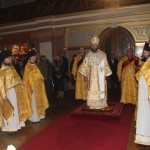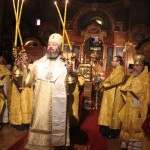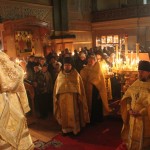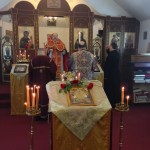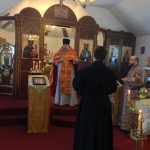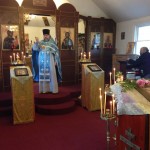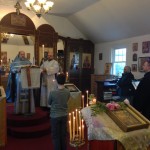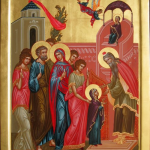On December 22, on the 26th Sunday after Pentecost, St. George Church held a liturgical celebration. The Divine Liturgy was served by the parish Rector, Archpriest Igor Tarasov. After the reading from the Gospel he preached a homily:
“Today is December 22, and this is the shortest day of the year. Last night was the longest night, but starting tomorrow the days little by little will get longer. Natural darkness will be overcome by light. In today’s Epistle lesson St. Paul also talks about the light and darkness, but in a spiritual sense.”
“Today’s Epistle reading to the Ephesians has many beautiful thoughts and instructions for us. Every phrase, every sentence of today’s reading is precious. But the main idea of St. Paul’s message was to remind his spiritual children that they have to spend their life wisely, doing things which are really important and necessary for salvation. The main thought is to tell us that we have a precious gift of time, and our time must be filled with rather spiritual, not worldly preoccupation. St. Paul calls it “to walk as children of light” (Eph. 5, 8). What a nice expression! We say that Jesus Christ is our Light, so we are His children, “children of Light”. Our journey of this life has to be “walking as children of light”. St. Paul shows the contrast between light and darkness, day and night. For him life without remembering of God, without faith in Jesus Christ was like walking in the darkness. And, on the contrary, since Christ is our Light, living with Him is walking in the light. But in order to walk in the light, as St. Paul tells us, we have to find out “what is acceptable to the Lord” (Eph. 5, 10). It means that we have to learn what is right and what is wrong, what is good and evil, eternal or temporary. It is about choosing what is best for us. And it is about establishing the priorities.”
“Today’s Epistle lesson becomes especially useful if we remember that we are in the middle of the Nativity Fast, if we recall that we should be preparing ourselves for Christmas. Here we are confronted with many visible features of this world, the world which often lives without remembering of God. All those commercials, advertisements dedicated to Christmas, all that rush with buying presents, going shopping and preparing for the holiday season, – all of that very rarely reminds us of the true meaning of Christmas. This kind of preparation may not be wrong by itself, but it is not going to get us far in our spiritual life. We have to remember about priorities. And the priority is to prepare for the Nativity by spiritual works, by prayer, fasting, and repentance. This is why the Church established this period called St. Philip’s Fast to help us in that preparation. This is the right time “to walk as children of light” and to walk carefully, as St. Paul instructs us, saying, “Walk circumspectly, not as fools but as wise, redeeming the time, because the days are evil. Therefore, do not be unwise, but understand what the will of the Lord is” (Eph. 15-17). I think that this is an excellent instruction!”
“When I served at one of my former parishes I once had a conversation with a woman, a parishioner of mine. She had certain disability and was not able to attend the church. I asked her whether she wants me to visit her during the Nativity Fast, so she could receive the Sacraments before Christmas. The woman answered that she is too busy preparing for the holidays. She said that she has to prepare the pirohy for Christmas Eve supper. The time the conversation occurred was three weeks before Christmas. Three weeks before the holy day, and this woman is saying that she has to spend most of her time making pirohy! Is Christmas about the pirohy or any other food? Was Christ born and came to this world, so we can make pirohy? Is it all He wants from us: the Christmas tree, decorations, lights, presents? Or maybe we should distinguish what is really important, necessary, and what is of the less importance. Having a traditional Christmas Eve supper with all those twelve meals is very nice. It is great, but it is much less important than having a pure heart, clean soul and joyful spirit. And Christmas shopping, certainly, is much less important than spending your time in prayer, in spiritual expectation of our Lord coming to us, in repentance for our sins, in going to confession. Believe me, staying and waiting in the line for confession is much more helpful and fruitful than spending your time in the line at the shopping center!”
“Going to confession before Christmas is spiritually fruitful. And St. Paul mentions today the word “unfruitful”. He urges us to “have no fellowship with the unfruitful works of darkness” (Eph. 5, 11). Time is precious, and we have to spend it fruitfully. Many worries, cares and preoccupations of this world are, in fact, unfruitful. And especially fruitless are the works of sin and dark desires of our corrupted nature. Why should we waste our time having fellowship with them?”
“Dear brothers and sisters! The message of today’s Epistle lesson is in the words of St. Paul who calls us, “Awake, you who sleep, arise from the dead, and Christ will give you light” (Eph. 5, 14). When we care about less important things, when we spend our time doing less important tasks, we are in the spiritual darkness, we are spiritually asleep, even dead. Let us awake, especially now, during this blessed time of Fast, let us walk in the light, let us walk “circumspectly”, not as fools, let us understand what the Lord’s will is for us. His will is that we remember that there is God who cares, who loves and who gave His only Son for us. This Son of God we should be expecting now, when we prepare for the holy days. This Son of God we should be expecting any day of our life. Thus, let us be awake and expecting!”
After the dismissal of the Liturgy Fr. Igor had a brief sermon about the feast of the Conception of the righteous Anna that we celebrate on December 22. He mentioned that Roman Catholics developed an elaborated teaching about the Immaculate Conception of Mary which they would celebrate today, if they were following our calendar. We, Orthodox Christians, do not share that Catholic belief not because we do not consider Virgin Mary sinless and immaculate, but because we strongly believe that Her freedom from sin was not a result of being “programmed” in the beginning, at the moment of Her Conception. It was a result of Her personal choice to serve the Lord and not to commit any sin. Of course, Virgin Mary was abundantly blessed by God’s grace to make such a choice. But the choice was Hers. And it was finally made when She responded to Angel Gabriel saying, “Behold, I am the servant of the Lord” (Lk. 1, 38). And today’s feast celebrated on the shortest day of the year when the light will soon begin to overcome darkness in the earthly nature, this feast reminds us of the Conception of Mary, the Theotokos who began Her life today. Later She was born, grew up and then She gave birth to the Son of God who overcame the darkness of this world.
Following the service our parishioners and the Rector enjoyed delicious meals and a good conversation at the coffee hour.

